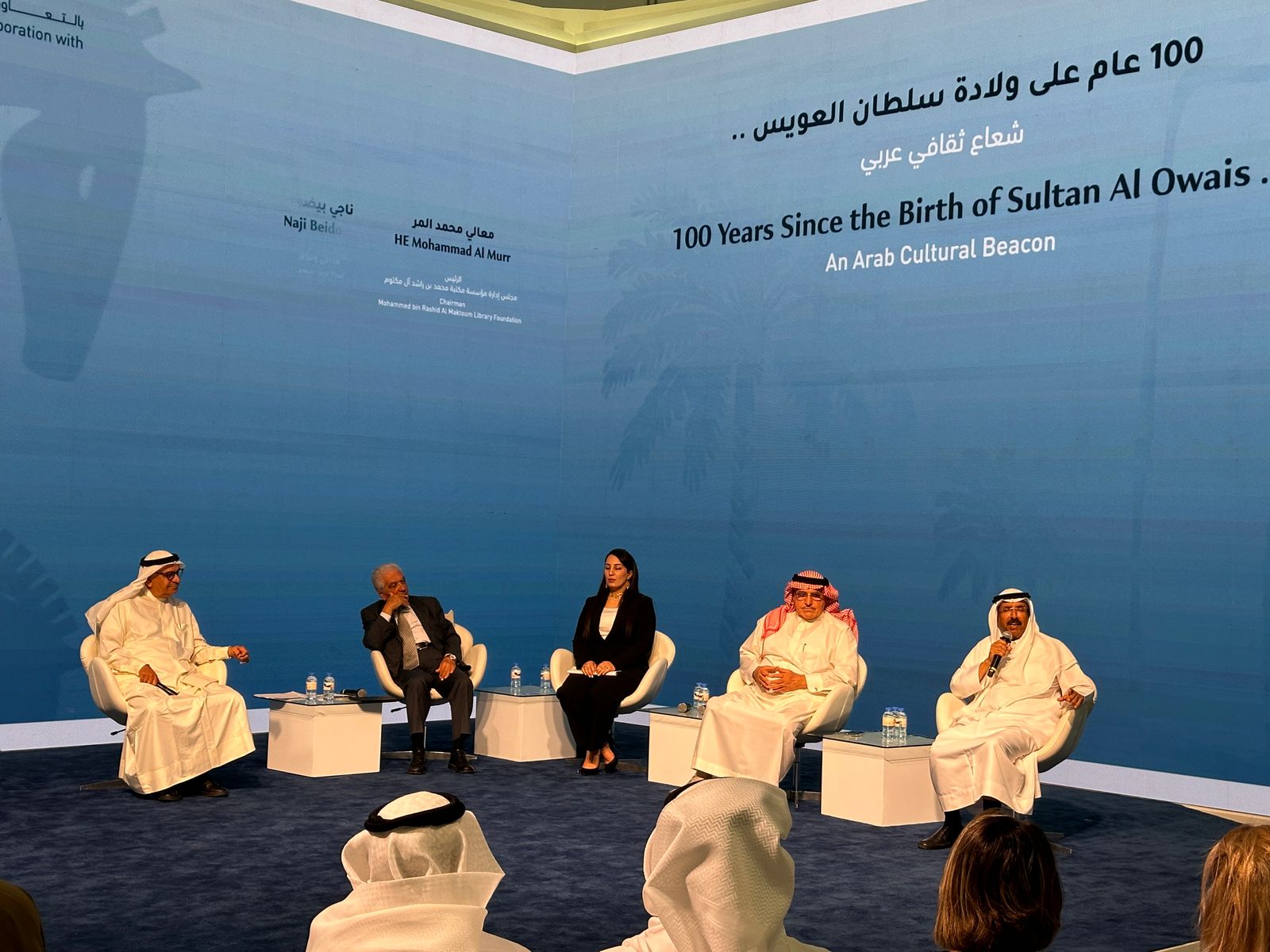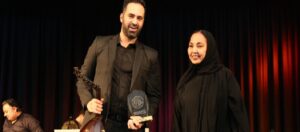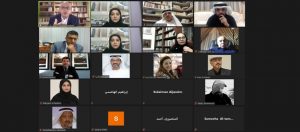In celebration of the centenary of the poet Sultan Bin Ali Al Owais, the Al Owais Cultural Foundation, in collaboration with the Abu Dhabi Arabic Language Centre, organised a central seminar titled “100 Years Since the Birth of Sultan Al Owais: An Arab Cultural Beacon”. The event was held as part of the Foundation’s participation in the Abu Dhabi International Book Fair (ADIBF 2025).
The seminar took place on the evening of Tuesday, April 29, and brought together a distinguished panel of speakers, including H.E. Mohammed Al Murr, H.E. Mohammed Reda Nasrallah, Dr. Naji Beydoun, and Dr. Haneen Omar. The session was expertly moderated by H.E. Abdul Hamid Ahmad, Secretary General of the Al Owais Cultural Foundation.
 The seminar drew a distinguished audience of intellectuals, writers, and media professionals, underscoring the cultural significance of the occasion. In his opening remarks, H.E. Abdul Hamid Ahmad welcomed the speakers and attendees, emphasising the importance of hosting the event during the Year of Sultan Al Owais—an international recognition granted by UNESCO in celebration of the poet’s centenary (1925–2025).
The seminar drew a distinguished audience of intellectuals, writers, and media professionals, underscoring the cultural significance of the occasion. In his opening remarks, H.E. Abdul Hamid Ahmad welcomed the speakers and attendees, emphasising the importance of hosting the event during the Year of Sultan Al Owais—an international recognition granted by UNESCO in celebration of the poet’s centenary (1925–2025).
He noted that the Al Owais Cultural Foundation has prepared a rich programme of initiatives to honour the legacy of Sultan Al Owais, including seminars, artistic and intellectual evenings, visual art exhibitions, as well as the issuance of a commemorative postage stamp, coins, and a series of distinguished books and publications.
Mohammed Al Murr spoke about his long-standing relationship with Sultan Al Owais, which spanned more than 30 years. He recalled getting to know him closely during visits to his literary majlis in Damascus—a space frequented by prominent Syrian and Lebanese writers.
The gathering, rich in cultural exchange, often centred around discussions of classical heritage texts that Sultan explored with his friends. Al Murr highlighted Sultan Al Owais’s noble character and poetic talent, noting that his influence deepened his own love for Damascus—its history, heritage, and people. He also touched on Sultan’s broader social and economic contributions within and beyond the UAE, most notably his founding of the prestigious Sultan Bin Ali Al Owais Cultural Award. With its financial independence and a dedicated endowment, the award has sustained its legacy for 37 years and evolved into a cultural institution renowned for its distinguished activities across the Arab world.
For his part, Mohammed Reda Nasrallah presented a paper titled “Between the Dynamite of Nobel and the Pearls of Al Owais”, in which he explored the concept of cultural capital as the sum of exceptional talents and capabilities possessed by individuals of wealth—alongside their material assets. In his paper, Nasrallah observed that whenever the subject of honorary awards in literature, science, arts, or social sciences arises, the name of Swedish Alfred Nobel and his globally recognised Peace Prize inevitably comes to mind.
Shortly before his death, Alfred Nobel recommended the establishment of the Nobel Peace Prize in 1890 to atone for the guilt he carried over his involvement in the arms industry—an enterprise he had inherited and expanded from his family.
At just 24, Nobel launched several business ventures with his family, notably acquiring Bofors, an iron and steel company that he expanded into a major manufacturer of cannons and weaponry. His invention of dynamite, though revolutionary, became a tool of destruction in the Crimean War and later European conflicts.
In contrast, Sultan Al Owais—born nearly a quarter of a century after Nobel, in 1924—chose to endow a cultural prize bearing his own name. Unlike Nobel, whose legacy has long been debated, Al Owais was persuaded by friends and admirers to attach his full name to a prize that celebrates creativity, culture, and intellectual achievement across the Arab world.
In contrast to Nobel, Sultan Al Owais was born into a family deeply rooted in the values of charity, social solidarity, education, knowledge, and poetry. His early life was shaped by the sea, where he worked alongside his father as Tawash (pearl trader), diving into the depths of the Arabian Gulf in search of pearls. Between the end of his boyhood and the beginning of youth, he began taking on his father’s role, sailing to the traditional pearl banks.
Then, Dr. Haneen Omar presented her paper titled “In the Wake of the Sea: Manifestations of Philosophy and Heritage in the Poetry of Sultan Bin Ali Al Owais”. She examined philosophy as a form of human reflection and a search for self through expanding questions and deepening consciousness, and heritage as a source rooted in identity, culture, history, and authenticity.
The paper reviewed the interweaving of these two dimensions in Al Owais’s poetry and their influence on the poems’ semiotic structure and critical value. While he is widely known as a poet of romance and love, Dr. Haneen Omar argued that a deeper reading reveals a profound philosophical inclination and a deliberate engagement with heritage. His vast cultural knowledge and life experiences—whether overt or subtle—echo through his verses, illuminating his texts like beacons amid the darkness of existential questions and human issues.
The seminar concluded with a personal testimony by Dr. Naji Beydoun, who had known Sultan bin Ali Al Owais for many years. He reflected, “Sultan was not only committed to supporting culture and intellectuals, but also deeply invested in industrial development across the Arab world.”
Dr. Beydoun noted that Sultan Al Owais established several industrial schools in various Arab countries, each at a cost of 10 million US dollars. He also highlighted Sultan Al Owais’s dedication to infrastructure, citing the construction of the Fujairah dams, which he personally visited each winter to ensure their proper functioning. Recalling a quiet evening walk along the banks of Dubai Creek, Dr. Beydoun shared a poignant moment: “Sultan suddenly stopped, turned to me, and said, ‘I have nothing left to do in this life—I’ve accomplished everything I set out to achieve.”





